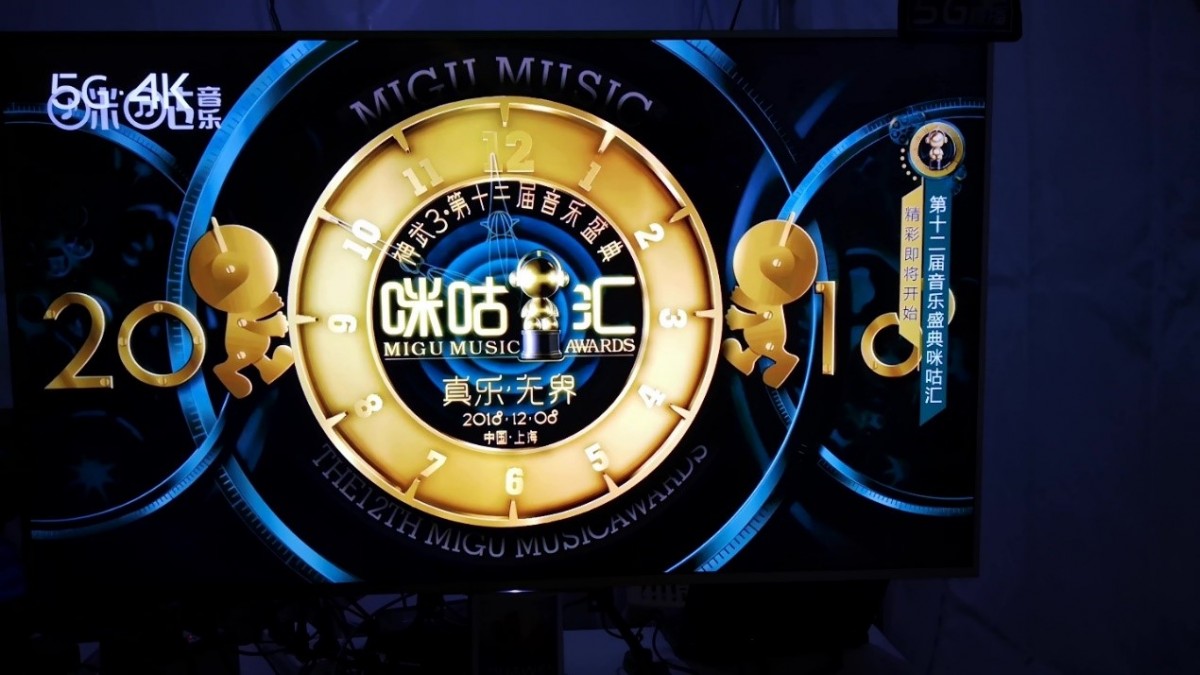Delivering a Real 4K UHD Experience
The real 4K UHD video has a resolution of 3840 x 2160 and a frame rate of 50 fps. 4K UHD images are smoother, more lifelike and more naturally deliver an in-person immersive experience to audiences. Such video transmission requires a high bandwidth and low latency. The transmission rate of 5G networks can reach 10-100 times that of 4G networks, to achieve smooth 4K mobile live broadcasting.
Migu's live broadcasting team director said that, "We have implemented E2E 5G+4K live broadcasting for this ceremony, including 4K filming, 4K transcoding, and 4K video streaming over 5G." When the ceremony started, 4K video cameras at the red carpet, main stage, and other locations, uploaded and sent UHD live signals to the Migu videoconferencing cloud data center for production and distribution through a 5G network slice established by Shanghai Mobile and Huawei. At the same time, the first application of 4K live broadcasting was achieved through this E2E network slice. Footage was streamed to an onsite 4K screen to showcase the award ceremony.
Building Dedicated Channels for Live Broadcasting
This live broadcasting uses Huawei's industry-leading E2E 5G network slicing solution, which enables carriers to slice a network into multiple virtual E2E networks on the same hardware infrastructure. Each slice logically isolates the terminals, radio access network (RAN), transport network (TN), and core network (CN) from end to end, to meet the differing requirements of industries in various service scenarios. Taking this ceremony as an example. Shanghai Mobile and Huawei set up 5G network infrastructure and are providing slice services to build dedicated channels that feature ultra-high bandwidths and ultra-low latency: a guaranteed experience for 4K UHD video playback.
5G network slicing has changed the 'one network, best effort' business model of the conventional 3G/4G network. It provides separate logical networks for different industries to meet their requirements in various service scenarios, helping carriers apply 5G networks to these industries. 5G network slicing has successfully verified its use for smart grids, smart ports, and mobile games. It will provide on-demand connection capabilities for various vertical industries.
Qiu Xuefeng, president of Huawei 5G Core, said: "5G will create new industries on an unprecedented scale. Network slicing is an important technology for enabling 5G services in more vertical industries. Huawei's 5G network slicing solution can implement on-demand network definition, quick deployment, automated operations, E2E SLA assurance, and capability exposure. Through this collaboration, the E2E technology and service verification of 5G network slicing is carried out in real multimedia business scenario for the first time. This will accelerate the maturity of related technologies and solutions."
Continuously exploring 5G+multimedia application innovation
In 2017, Migu joined hands with China Mobile Research Institute, Huawei, mainstream media, and various universities to set up the 5G Multimedia Innovation Alliance (5MII). This alliance is aiming to innovate multimedia technologies based on 5G mobile networks and formulate relevant standards. Seizing the opportunity provided by this music ceremony, Migu will establish a long-term cooperation with China Mobile and Huawei to continuously explore application innovation in 5G+multimedia, and convert resulting achievements into industry consensus through platforms such as 5MII and 5G Slicing Association (5GSA). This should promote the development of the 5G+multimedia industry.
A representative of Shanghai Mobile said, "The usage of 5G network in various vertical industries will create great changes. China Mobile hopes to implement the concept of 'slicing as a service' to meet the requirements of different vertical industries, and achieve convergence and innovation in industry applications and 5G networks. ”




